
 i_need_contribute
i_need_contribute

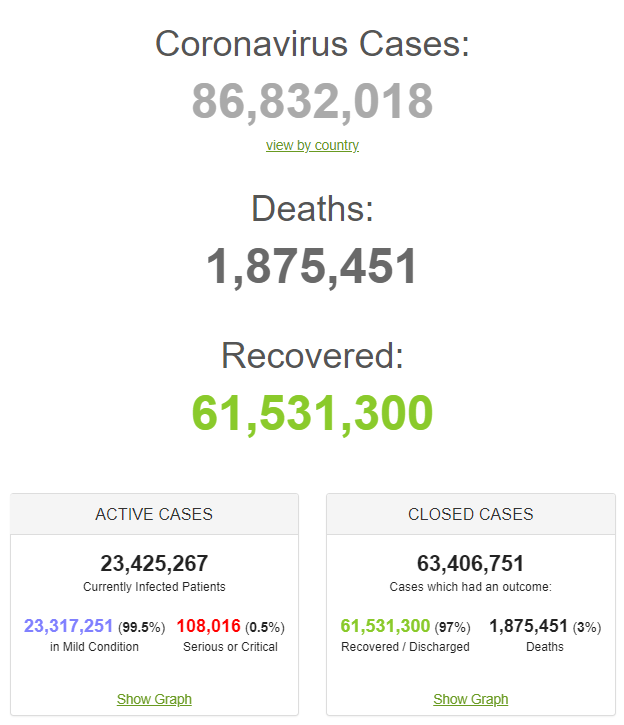
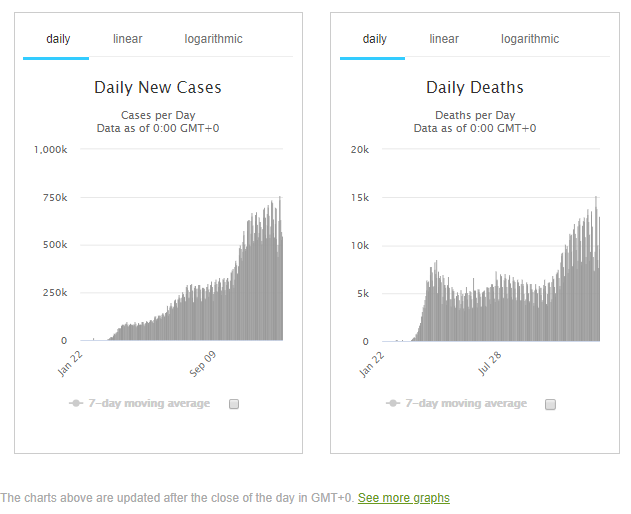
|
Country, |
Total |
New |
Total |
|
World |
86,820,680 |
+684,615 |
1,875,209 |
|
21,579,641 |
+226,593 |
365,664 |
|
|
10,375,478 |
+17,909 |
150,151 |
|
|
7,812,007 |
+57,447 |
197,777 |
|
|
3,284,384 |
+24,246 |
59,506 |
|
|
2,774,479 |
+60,916 |
76,305 |
|
|
2,680,239 |
+20,489 |
66,282 |
|
|
2,270,101 |
+14,494 |
21,879 |
|
|
2,181,619 |
+15,378 |
76,329 |
|
|
1,982,544 |
+16,343 |
51,430 |
|
|
1,814,565 |
+18,349 |
37,180 |
|
|
1,702,966 |
+16,835 |
44,426 |
|
|
1,662,730 |
+13,790 |
43,785 |
|
|
1,455,219 |
+6,464 |
127,757 |
|
|
1,330,543 |
+7,624 |
29,502 |
|
|
1,255,620 |
+6,113 |
55,748 |
|
|
1,127,759 |
+14,410 |
30,524 |
|
|
1,083,585 |
+5,334 |
19,129 |
|
|
1,022,018 |
+960 |
37,925 |
|
|
834,064 |
+6,338 |
11,826 |
|
|
779,548 |
+7,445 |
23,109 |
|
|
759,689 |
+12,901 |
12,346 |
|
|
650,887 |
+876 |
19,750 |
|
|
648,288 |
+4,729 |
16,178 |
|
|
623,101 |
+2,460 |
16,788 |
|
|
618,646 |
+7,222 |
16,233 |
|
|
599,126 |
+757 |
12,856 |
|
|
517,920 |
+991 |
7,670 |
|
|
490,476 |
+1,947 |
10,409 |
|
|
479,693 |
+937 |
9,321 |
|
|
456,139 |
+7,966 |
3,495 |
|
|
445,439 |
+1,637 |
7,581 |
|
|
436,579 |
+4,956 |
7,286 |
|
|
369,721 |
+2,311 |
6,457 |
|
|
363,259 |
+104 |
6,265 |
|
|
349,238 |
+2,653 |
3,405 |
|
|
329,721 |
+870 |
10,080 |
|
|
301,303 |
+1,472 |
3,940 |
|
|
262,784 |
+522 |
1,893 |
|
|
259,770 |
+3,540 |
4,238 |
|
|
247,960 |
+4,113 |
3,655 |
|
|
232,079 |
+2,316 |
2,646 |
|
|
221,401 |
+802 |
2,792 |
|
|
216,699 |
+1,967 |
685 |
|
|
216,083 |
+1,003 |
14,103 |
|
|
214,390 |
+1,071 |
4,179 |
|
|
205,390 |
+1,310 |
7,902 |
|
|
203,104 |
+1,273 |
1,471 |
|
|
195,759 |
+3,620 |
1,529 |
|
|
191,088 |
+2,989 |
2,603 |
|
|
Dominican |
175,849 |
+475 |
2,419 |
|
173,591 |
+1,155 |
2,248 |
|
|
172,779 |
+1,992 |
1,420 |
|
|
163,671 |
+1,010 |
9,219 |
|
|
160,544 |
+324 |
2,878 |
|
|
158,302 |
+723 |
2,262 |
|
|
152,027 |
+312 |
938 |
|
|
149,497 |
+1,510 |
1,996 |
|
|
147,061 |
+2,265 |
4,934 |
|
|
146,921 |
+612 |
3,070 |
|
|
144,852 |
+208 |
245 |
|
|
144,583 |
+1,119 |
7,918 |
|
|
143,169 |
+941 |
1,505 |
|
|
141,453 |
+927 |
5,051 |
|
|
139,419 |
+763 |
4,859 |
|
|
129,774 |
+190 |
1,502 |
|
|
128,370 |
+2,512 |
2,868 |
|
|
127,584 |
+59 |
2,766 |
|
|
126,241 |
+322 |
1,963 |
|
|
123,398 |
+29 |
3,181 |
|
|
122,845 |
+2,027 |
509 |
|
|
114,662 |
+255 |
1,042 |
|
|
113,322 |
+5,325 |
2,282 |
|
|
110,796 |
+959 |
2,321 |
|
|
102,456 |
+481 |
1,536 |
|
|
100,873 |
+228 |
2,782 |
|
|
97,127 |
+219 |
1,690 |
|
|
93,995 |
+229 |
352 |
|
|
92,705 |
+1,354 |
1,319 |
|
|
87,183 |
+33 |
4,634 |
|
|
84,709 |
+580 |
2,559 |
|
|
81,512 |
+124 |
1,360 |
|
|
77,295 |
+37 |
614 |
|
|
64,979 |
+715 |
1,007 |
|
|
60,283 |
+660 |
1,210 |
|
|
58,749 |
+28 |
29 |
|
|
52,180 |
+935 |
452 |
|
|
50,054 |
+424 |
699 |
|
|
47,355 |
+268 |
1,373 |
|
|
47,149 |
+163 |
514 |
|
|
6,586 |
+93 |
125 |
|
|
5,716 |
+110 |
50 |
|
|
1,504 |
+7 |
35 |
Retrieved from: https://www.worldometers.info/coronavirus/
From CNN's Jake Kwon in Seoul, South Korea
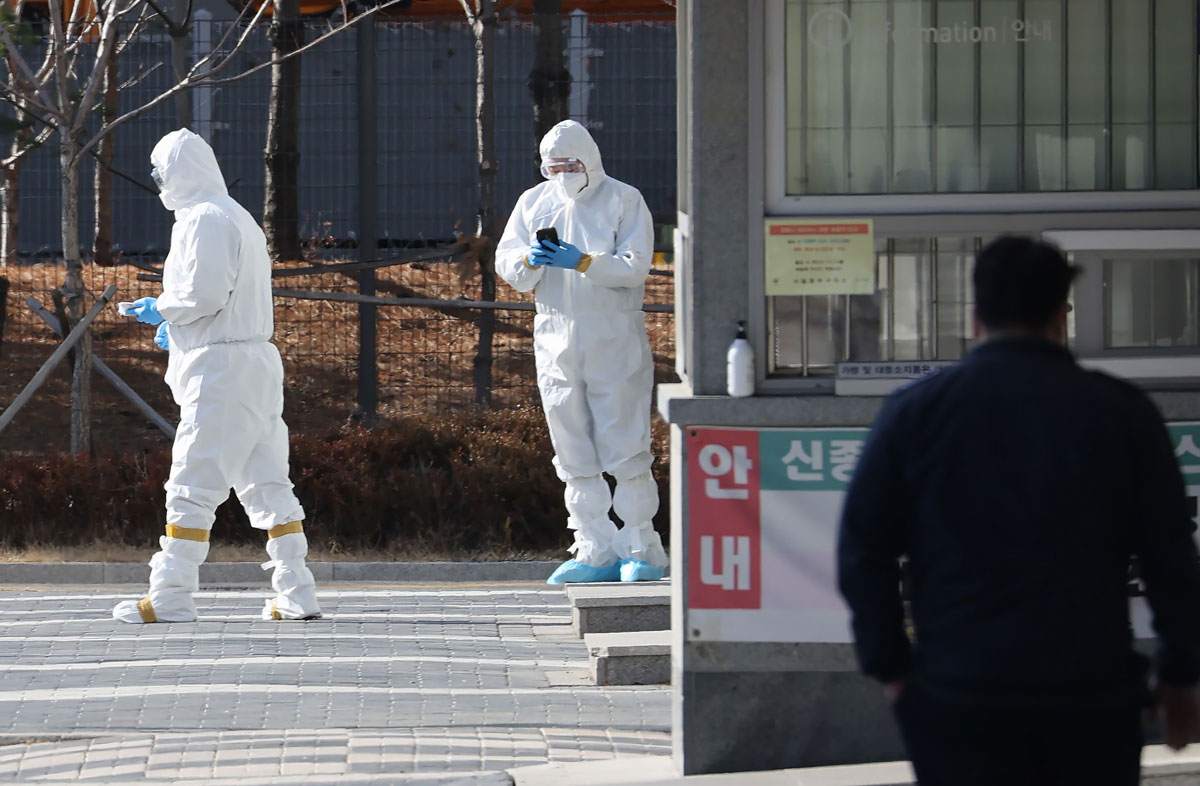
Medical workers prepare to conduct Covid-19 tests on all inmates at Dongbu Detention Center in Seoul, South Korea on January 5. Yonhap/EPA-EFE/Shutterstock
South Korea will test every prisoner held in the country's 52 detention facilities for Covid-19 after a cluster of cases emerged at a detention center in the capital Seoul.
Health Ministry official Yoon Tae-ho announced the plan at a briefing Wednesday. Yoon said that prisoners at 11 facilities had already been tested and, so far, no positive cases had been reported. Prisoners at the other 41 facilities have not yet been tested, Yoon said.
Viruses can spread easily in prisons because of their small, cramped quarters and lack of fresh air. The cluster in Seoul's Dongbu Detention Center exploded in just weeks. It was detected in mid-December, and authorities have now found 1,118 cases tied to the detention center, mostly among the prison population. The facility housed 2,292 inmates when the first cases were identified.
Justice Ministry official Kim Jae-sul said the detention center was overcrowded when the cluster was detected, which would make it easier for the virus to spread. Yoon, the Health Ministry official, said 972 prisoners have been transferred to different facilities, lowering the population density.
New cases: South Korea identified 809 local and 31 imported coronavirus cases on Tuesday, the Korea Disease Control and Prevention Agency (KDCA) said in statement. Of those, 567 cases were found in the Seoul metropolitan area.
Though cases are slowly declining, a winter surge had authorities scrambling to find new hospital beds, especially in Seoul. Yoon said authorities had "secured" more beds for Covid-19 patients and that there were now a total of 177 ICU beds available for coronavirus treatment nationwide.
To date, 65,818 cases of Covid-19 have been identified in South Korea, killing 1,027 people.
From CNN's Julia Hollingsworth
Countries around the Asia-Pacific region have closed borders and imposed strict quarantine requirements, essentially sealing themselves off from the world.
But in many jurisdictions there's a key exception to those rules: flight crews.
For months, flight crews in a number of places -- including Taiwan and Australia -- have been able to avoid the tough quarantine rules imposed on other international travelers. But rule breaches by airline staff in both places in December have prompted questions about whether exemptions for aviation workers are creating an unnecessary risk to the public.
Taiwan has now tightened its quarantine rules for flight crews, something two Australian states did in December.
But it's a tricky predicament. While health experts say that treating flight crews differently is a loophole in an otherwise tough border approach, aviation industry officials say exemptions are needed to keep the industry operating -- and avoid jeopardizing flight crews' mental health.
What happened in Taiwan? When Taiwan reported its first locally-transmitted case in more than 250 days on December 22, authorities quickly pin-pointed a foreign pilot as the source of infection.
Authorities said a New Zealand pilot in his 60s infected a woman in her 30s after completing the required three days of quarantine required for pilots, Taiwan state media CNA reported. That pilot has now been fined by Taiwanese authorities for not disclosing his complete contact history and fired by his company.
What happened in Australia? A series of incidents in December prompted questions over quarantine exemptions for flight crews. A Sydney van driver who had transported international flight crews tested positive at the start of December.
Later that month, New South Wales Police fined 13 international air crew members 1,000 Australian dollars ($760) each for going to a number of Sydney venues when they should have been quarantining. And just before Christmas, a Qantas crew member tested positive after flying into Darwin from Paris and then boarding a domestic flight.
Retrieved from: https://edition.cnn.com/world/live-news/coronavirus-pandemic-vaccine-updates-01-06-21/index.html
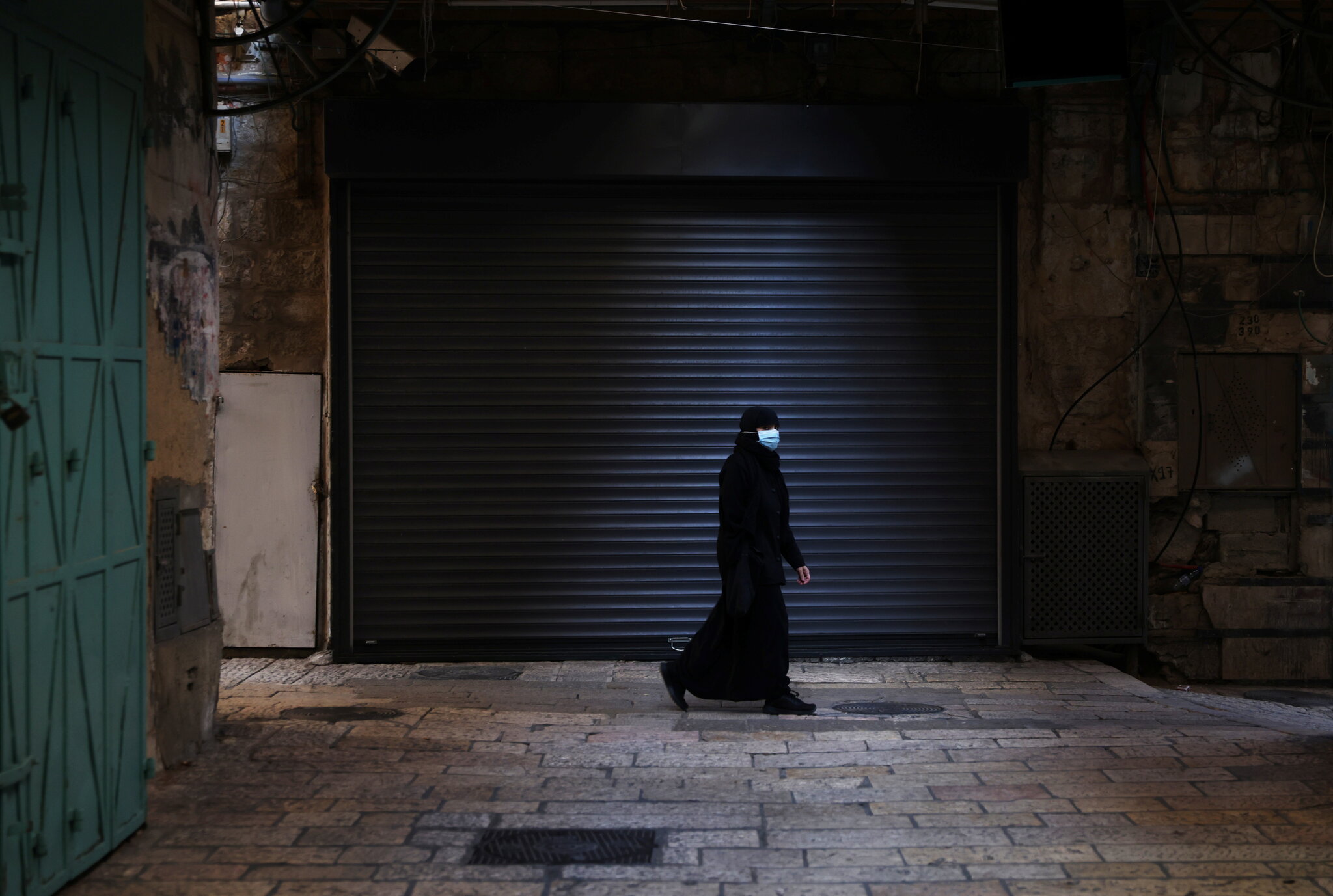
JERUSALEM — The Israeli government announced on Tuesday that it would tighten its lockdown as coronavirus cases in the country have climbed rapidly over the past week.
In late December, Israel entered into its third nationwide lockdown, but much of the public has since flouted restrictions, prompting health experts to call for tougher enforcement.
The government still has not published a comprehensive list of the newest restrictions, but cabinet ministers confirmed that it decided to shutter schools except for those that provide special education and serve youth at risk.
In a short joint statement, the prime minister’s office and the Health Ministry said the new measures would take effect on Friday and would remain in place for two weeks. They also said that access to flights abroad would be limited.
The government still needs to formally approve the measures, but it is expected to do so in the coming 24 hours.
In addition, Israel’s Parliament, the Knesset, is required to vote on the restrictions. A controversial law passed in July, however, allows them to come into effect before it deliberates on the matter.
Earlier on Wednesday, Prime Minister Benjamin Netanyahu cited the new, highly transmissible variant of the virus that was first identified in the United Kingdom as a reason why Israel needed to stiffen its lockdown.
“We are at the height of a global pandemic that is spreading at record levels with the British mutation,” Mr. Netanyahu said in a recorded statement. “It arrived in Israel and it will claim many lives.”
As of Monday, there were 30 known cases of the variant in Israel, the Health Ministry said. Israel has averaged 5,841 virus cases per day over the past week — a significantly higher number than the preceding seven days, according to a New York Times database.
Retrieved from: https://www.nytimes.com/live/2021/01/05/world/covid-19-coronavirus/israel-extends-its-lockdown-as-virus-surges
By Sarah Marsh
Thousands of the most vulnerable children have been sent to unregulated care homes during the pandemic at a cost of millions to the taxpayer, a Guardian investigation has found.
Council bosses say they have nowhere else to put those most at risk as there are not enough places for the number of children in need, which has soared during the Covid crisis. The result is young people are placed in supported living facilities not monitored by Ofsted and therefore deemed a safety risk. One council chief described these homes as the “wild west”.
Anne Longfield, the children’s commissioner for England, said the children’s care system had been “left to slip deeper into crisis” this year and that children were now being put at risk of “abuse or exploitation” after being let down by the authorities.
Unregulated homes, often known as supported accommodation for those over 16, are not inspected by a regulator in England or Wales. They are allowed within the law because they are qualified to offer support not care, and young people housed there live semi-independently. But critics say that they are unsuitable due to the lack of checks to monitor them. Children, who are in some cases under 16 when placed in these settings, are more at risk to exploitation from abusers of drugs gangs.
A Guardian investigation based on data from 114 councils reveals that despite calls for use of these homes to be banned:
Last year, at least 8,373 children have been placed in semi-independent accommodation – during the pandemic. More than a third of these placements (2,844) were out of the local authority area, meaning children were sent miles away in an unregulated setting.
The figure, despite being an incomplete year, is higher than numbers from 2018-19, when 7,742 children were put in such accommodation. Over the last three years, more than 25,000 vulnerable young people were placed in these homes.
Speaking anonymously, council commissioners of children’s services said the system of housing vulnerable children had broken down, and they had no other options. They warned that private providers were unwilling to take the most difficult young people due to the impact on their Ofsted rating.
Councils are being forced to set up their own form of regulation on these homes, sending officers to visit them. However, the amount of checks and balances in place varies across the country.
One young person the Guardian spoke to said they were housed somewhere that turned out to be a trap house, a place where drugs are stored and distributed. They feared for their life.
There were also 93 placements last year year – up from 80 three years ago – in completely unregistered children’s homes. Any unregistered home which delivers an element of “care” as well as accommodation would be acting illegally. Unregistered provision is when a child who’s being provided with some form of care is living somewhere that is not registered with Ofsted.
Longfield said a many unregulated providers were private companies making a huge profit off vulnerable children, without the checks and balances that are seen in other care settings. “Three-quarters (73%) of unregulated provision is privately run, and this part of the care sector is fast expanding. The financial opportunity presented can attract entrants to the market that know little or nothing about the care of children, with the upshot that, in some settings, children are not kept safe.”
She said coronavirus was likely to plunge more young people into care, placing “pressure on already very stretched local authority budgets”. Councils have experienced budget cuts of 29% since 2010 and in 2018-19 they overspent for children’s social care by £770m.
The overall number of the use of unregulated provision is likely to be far higher than these estimates due to the limited number of councils who responded to a freedom of information request by the Guardian. Previous research suggests the average annual cost of placements was between £9,714 a year and £364,980, meaning the total bill across all authorities is likely to run into the millions.
Longfield said the placements were, “completely unsuitable for their [children’s] needs. Often this accommodation puts them at risk of abuse or exploitation.”
She said over the last five years the system had been “left to slip deeper into crisis, seemingly unable to stop some of the most vulnerable children from falling through the gaps.”
She is calling for the government to ban under-18s in care from being placed in “unregulated accommodation, and launch the independent review into children’s social care promised in the Conservative manifesto”.
One commissioner of children’s services, speaking anonymously, said there was a growing number of children requiring residential care, driven by austerity but they face “limited supply” of where to house them. They said in London alone they needed 58-60% more beds.
Three-quarters of homes in England are now private, which means that providers can choose whether they want a child and often they do not want those with complex needs as it affects their Ofsted rating, he said, leaving councils unable to find homes for them. “You end up placing a child based on market availability, not on where is the best place for that child,” they said.
They added that because these homes did not have the oversight of Ofsted the council had started to create its own accreditation system, going out and doing checks on properties to see if they meet standards.
A government spokesperson said it had invested £40m in secure children’s homes to support councils to meet this duty, with an extra £24m announced in November last year. This, alongside their independently-led care review, would support improvements, the spokesperson said.
“Independent and semi-independent provision can be the right choice for some older children who are ready for this, but we are clear that it should not be used for younger children – that’s why we have consulted on a ban on these placements for under-16s as well as introducing national standards to improve the quality of this provision,” they said.
Retrieved from: https://www.theguardian.com/society/2021/jan/06/thousands-of-children-sent-to-unregulated-care-homes-amid-covid
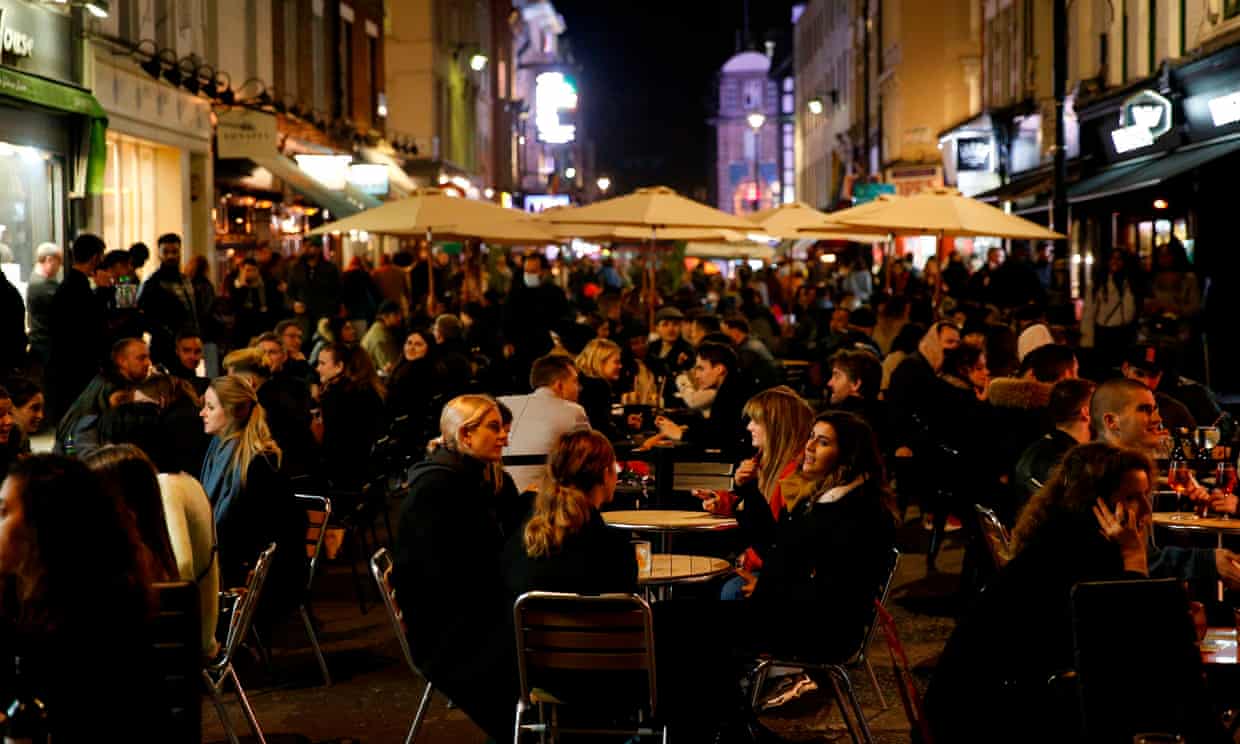
Socialising in Soho, London, in early November prior to the second lockdown in England. Photograph: Hollie Adams/AFP/Getty Images
The leak of plans for a November lockdown in England to the media approximately a week before restrictions came into force has been linked by researchers to a jump in Covid-19 cases caused by people rushing to socialise before the deadline.
“There was a surge in new infections starting a couple of days before the lockdown – and running for about a week or so after the lockdown was implemented,” said the study’s lead author, Paul Hunter, a professor in medicine at the University of East Anglia.
The three-tier system, with varying degrees of restrictions, was introduced in England in mid-October. On Friday 30 October multiple outlets, including the Times, Daily Mail and Sun, reported that the government planned to announce a national lockdown the following Monday, prompting the launch of a leak inquiry. The lockdown eventually came into force on 5 November and ended on 2 December.
Using data procured from 315 local authorities, the researchers observed that case numbers were increasing up to about 24 October, after which they appeared to stabilise, even declining in tier 3 areas. However, over the “notice period” between the news becoming public and the start of lockdown, case numbers started to rise again until they reached a peak around 10 November.
The observational study – which is still to be peer-reviewed – found that this boost in infections was largely seen in tier 1 and tier 2 areas, where there were more opportunities to socialise compared with in tier 3 regions.
The surge was most notable in the 20 to 24 and 25 to 29 age groups, although there was an effect in all age groups up to 60, noted Hunter. “Those of us over 60 are boring old farts who stay home all the time,” he joked.
Using Google mobility data, the researchers noted an increase in visits to non-grocery retail and leisure venues just prior to the start of lockdown.
The spike was not observed in tier 3 areas, where a key difference was that hospitality venues could only open if operating as a restaurant. This finding, combined with the atypical surge in infections in young adults, suggests there had been increased socialisation ahead of the lockdown.
“I believe it probably almost certainly is,” said Hunter. “You can’t say that’s absolute proof, but I think it’s excellent strong supportive evidence.”
“If that is the case, then … whoever leaked that indirectly would have been responsible for increased cases and, and almost certainly increased deaths.”
As December approached, infections in areas that were previously in tier 1 were pretty much at the same level as they were on 1 November. So, after about a month which largely included the lockdown, “we were back to square one”, Hunter said.
Tier 2 regions did a little better – the infection rate was lower, but not by much. Tier 3 areas – which did not see a spike ahead of the lockdown – saw a dramatic decline, he added.
However, in London, the south-east and east of England, cases started rising in the week before lockdown ended, which was later attributed to the fast-spreading variant discovered in Kent. “So that that surge towards the end was almost certainly … driven by the new variant,” added Hunter.
Retrieved from: https://www.theguardian.com/uk-news/2021/jan/06/leak-of-november-covid-lockdown-plan-linked-to-surge-in-new-infections-say-researchers
· WHO chief ‘very disappointed’ after China blocks’ Wuhan visit. China has blocked the arrival of a team from the World Health Organization investigating the origins of the coronavirus pandemic, claiming that their visas had not yet been approved even as some members of the group were on their way.
· One in 50 people in England had Covid last week. One in 50 people in private households in England– more than 1.1 million – are estimated to have had the coronavirus in the week ending 2 January.
· In England, leak of November lockdown plan linked to ‘surge in new infections’. The leak of plans for a November lockdown in England to the media approximately a week before restrictions came into force has been linked by researchers to a jump in Covid-19 cases caused by people rushing to socialise before the deadline.
· South Korea rolls out mass testing for 70,000 prisoners and staff. South Korea rolled out mass testing for 52 prisons in the country after a massive prison outbreak and may extend flight suspensions from Britain in a bid to prevent the spread of coronavirus cases, the health minister said on Wednesday.
· China stepped up Covid measures. The northeastern Hebei province surrounding Beijing on Tuesday entered a “wartime mode” after reporting its first local infections in more than six months. The province will set up investigation teams to trace the close contacts of those who have tested positive.
· Tokyo’s new daily coronavirus cases topped 1,500 on Wednesday – a fresh record, local media reported, as Japan braces for a renewed state of emergency for the Greater metropolitan area. The previous record for the capital was 1,337, set on 31 December.
· Brazil’s syringe manufacturers said they will supply 30 million syringes and needles for the country’s Covid-19 vaccination program after the government said it would requisition surplus supplies.